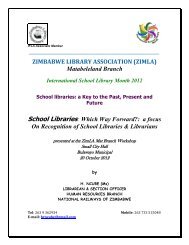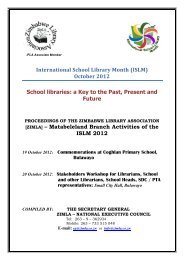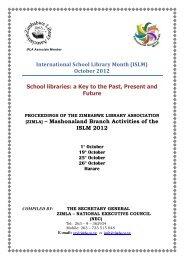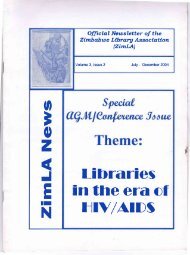A FORCE TO RECKON WITH - Zimbabwe reads
A FORCE TO RECKON WITH - Zimbabwe reads
A FORCE TO RECKON WITH - Zimbabwe reads
You also want an ePaper? Increase the reach of your titles
YUMPU automatically turns print PDFs into web optimized ePapers that Google loves.
Branch and Section NEWS<br />
A second highlight was our participation, in conjunction with the<br />
Ministry of Information, Posts and Telecommunications, in last year's tour<br />
ofthe Bookweek Africa Exhibition, which was part ofthe International Book<br />
Fair. Mr Mparutsa was responsible for mounting the Exhibition for the<br />
Murewa and Mutoko people and I was responsible for the Exhibition in<br />
Kadoma and KweKwe. Though the experience was new, it was exciting as<br />
well.<br />
In pursuit of your mandate, the Committee sought an audience with<br />
the <strong>Zimbabwe</strong> Publishers Association to discuss matters of mutual concern;<br />
the quality of bookbinding; the high cost of books; the lack of a<br />
variety of children's books. Unfortunately, we have not yet succeeded in<br />
meeting them, and I urge the new Committee to pursue this matter rather<br />
than to shelve it.<br />
Our links with the school library world outside <strong>Zimbabwe</strong> continue to<br />
grow. Subscriptions to the School Librarian and Junior Bookshelf were<br />
renewed. In addition, a new subscription has been entered for the School<br />
Library Journal from the United States. From a socialist or from another<br />
African country, we also hope to order just one more journal. I urge you to<br />
consider these part of your resources. They can help you with ideas and<br />
inspiration for your work. More than that, their book reviews can also help<br />
you with information about new books to accession for your school<br />
libraries.<br />
In spite of our low profile last year, our membership has continued to<br />
grow. It now stands at 105, up by 14 from last year's. We hope that those of<br />
you at today's session, those who are not yet members, will take away with<br />
you application forms for membership. They should be mailed back to<br />
Mr Motsi, c/o the University of <strong>Zimbabwe</strong> Library. Membership benefits<br />
are described on the application forms. Do recruit others as well.<br />
The highlight for each year has often been the August holiday course<br />
for teachers in charge of school libraries. Last year, however, the course was<br />
not held, chiefly because of three reasons: (i) the late appointment of a<br />
successor to Mrs Smith, (ii) few people applied and it was felt a viable<br />
course was not possible, and (iii) the existence of a number of loose ends<br />
coinciding with the deadline date. There should be no problems of a similar<br />
nature this year.<br />
On the productive side, three issues of Arrakis, the School Libraries<br />
Newsletter, have been published since July 1983. All credit should go to<br />
Mr Mparutsa who, despite the short time, has already charted a system<br />
which school libraries should follow. A book development council is<br />
needed to plan and oversee a more systematic introduction of reading<br />
materials into schools. The council would also be responsible for book<br />
reviews — but there is a bonus: each book that you receive is yours to do<br />
whatever you like with.<br />
Branch and Section NEWS<br />
Next, the British Council has operated a Book Presentation Programme<br />
from which several schools have benefited. Schools in Manicaland and<br />
Matabeleland have, so far, been the beneficiaries. The Swedish International<br />
Development Agency (SIDA) donated books you will be receiving on<br />
behalf of your school libraries today, and the United States Information<br />
Service has time and again donated periodicals and journals. Other<br />
embassies have also been approached, and we hope that you will continue<br />
to build on to these initiatives by urging your school administrators to<br />
do their part as well.<br />
In closing, I would like to thank some schools in Harare who have<br />
hosted many of our meetings. Without their support, many of our activities<br />
would be grounded. To ZLA members, our thanks for their continued professional<br />
help. I should not also forget those who often attend Section<br />
meetings. My appeal is for your support not to flag, as dedication is the<br />
hallmark of any successful organisation. My Committee has already<br />
demonstrated its part because my appointment to another post within the<br />
Ministry could have disrupted all activities. This, however, did not take<br />
place.<br />
And lastly, the Schools Librarian has achieved some notable successes<br />
within so short a time: the visits to rural schools; the Murewa Exhibition and<br />
the contacts with Embassies for reading materials. We hope that he will<br />
continue with the same tireless spirit to further the aims and objectives of<br />
our School Libraries Section.<br />
The School Libraries Section has set up a Council to assist school<br />
librarians in the development of better book stocks. The followingare some<br />
of the aims of the Council:<br />
(a) to review a wider range of books for the purpose of encouraging a<br />
wider reading of different types of books;<br />
(b) to liaise with publishers, authors and sellers of potential school<br />
library materials for young adults;<br />
(c) to continually draw the attention of school libraries to the wide<br />
range of reading materials that are being published;<br />
(d) to encourage the writing of more books, particularly those not<br />
normally regarded as textbooks, for young adult readers;<br />
(e) to help provide and stock school libraries with specific reading<br />
materials for which they express or specify a need;<br />
(f) to encourage the physical establishment of school libraries by<br />
giving to newly built school libraries, reference materials which<br />
they might otherwise be unable to afford;<br />
(g) to reach a wider variety of target reading-audiences in schools;<br />
(h) to capitalise on economies of scale by buying in bulk;<br />
(i) to tie up book provision with readership campaigns.<br />
18<br />
19











